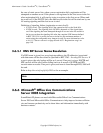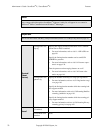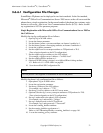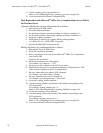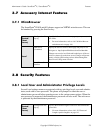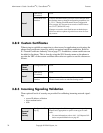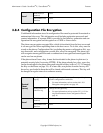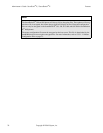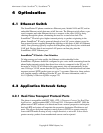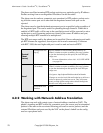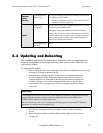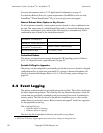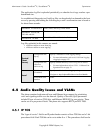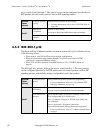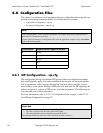Administrator’s Guide - SoundPoint
®
IP / SoundStation
®
IP Optimization
Copyright © 2006 Polycom, Inc. 77
4 Optimization
4.1 Ethernet Switch
The SoundPoint
®
IP phones contain two Ethernet ports, labeled LAN and PC, and an
embedded Ethernet switch that runs at full line-rate. The Ethernet switch allows a per-
sonal computer and other Ethernet devices to connect to the office LAN by daisy
chaining through the phone, eliminating the need for a stand-alone hub. The
SoundPoint
®
IP switch gives higher transmit priority to packets originating in the
phone. SoundPoint
®
IP can be powered through a local AC power adapter or can be
line-powered (power supplied through the signaling or idle pairs of the LAN Ethernet
cable). Line powering typically requires that the phone plugs directly into a dedicated
LAN jack. Devices that do not require LAN power can then plug into the
SoundPoint
®
IP PC Ethernet port.
SoundPoint
®
IP Switch - Port Priorities
To help ensure good voice quality, the Ethernet switch embedded in the
SoundPoint
®
IP phones should be configured to give voice traffic emanating from the
phone higher transmit priority than those from a device connected to the PC port. If
not using a VLAN (VLAN blank in the setup menu), this will automatically be the
case. If using a VLAN, ensure that the 802.1p priorities for both default and real-time
transport protocol (RTP) packet types are set to 2 or greater. Otherwise, these packets
will compete equally with those from the PC port. For more information, refer to
4.6.1.9 Quality of Service <QOS/> on page 118.
4.2 Application Network Setup
4.2.1 Real-Time Transport Protocol Ports
The phone is compatible with RFC 1889 - RTP: A Transport Protocol for Real-Time
Applications - and the updated RFCs 3550 and 3551. Consistent with RFC 1889, the
phone treats all RTP streams as bi-directional from a control perspective and expects
that both RTP end points will negotiate the respective destination IP addresses and
ports. This allows real-time transport control protocol (RTCP) to operate correctly
even with RTP media flowing in only a single direction, or not at all. It also allows
greater security: packets from unauthorized sources can be rejected.



